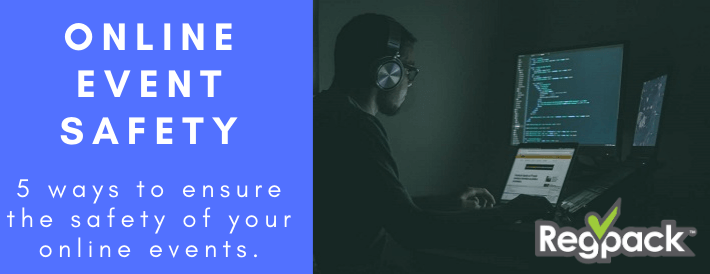The proliferation of virtual events following the pandemic is one way we humans have tried to adapt to the changing times. Unfortunately, unscrupulous individuals are also aware of its growing popularity, and are trying their best to exploit them.
Case in point, many Zoom users have experienced unwanted “Zoom bombing” instances over the past few months, where random attendees hijack calls to disrupt the participants. While this is just a small way to disrupt an event, it opens our eyes to the possibility of data breaches.
That said, we’ve outlined a few ways you can keep your virtual event safe from cybersecurity threats.
Regulate event access
Just as you would an in-person event, you need to know who and how many people are participating. This way, you’ll get to prevent unwanted attendees from crashing your virtual party.
In order to mitigate this risk, regulate access to the event by including a registration process. The simplest way to do this is by using an online registration software that can keep your events operations as simple as possible. Otherwise, you can use a dedicated registration system your organization might already have, or just gather attendees through email. Once complete, make sure to only grant access to attendees you’ve vetted.
Choose the right platform
The hard truth is that some virtual event meeting software is better than others on the market. Make sure you select one that meets your needs and the type of event you’re holding, whether it is a virtual conference, webinar, or hybrid event.
Do some research before selecting the appropriate one, and pay attention to customer reviews and testimonials. A general rule of thumb is that experienced and well-reviewed providers usually have robust information technology architecture and have experienced development teams on board. Additionally, make sure to check what their customer service is like too.
Consider hiring a cybersecurity professional
Cybersecurity can be a complex issue — especially if it’s not your area of expertise. This is why it may be prudent to hire professionals instead. Although IT security consultants are an added expense, students graduating with online cybersecurity degrees are trained to prevent data theft and preserve data integrity, which can help ensure your online event’s safety. They can also help with coming up with materials to educate your attendees, as part of security also relies on the vigilance of those at the event.
Educate attendees
90% of data breaches are caused by human error, so to ensure your event is not part of this statistic, it’s prudent to educate everyone attending on how to stay safe online. If you’ve hired that cybersecurity professional we discussed earlier, you might be able to ask them for help with creating the right message to send to your attendees. Consider sending a newsletter ahead of time, or dedicating a small part of the program to teaching them about cybersecurity practices. After all, teaching them the basics could go a long way in preventing breaches and other cybercrimes while making sure you’ve got all your bases covered at the same time.
Monitor activity during the event
While the aforementioned tips should help prevent any safety concerns while you hold your event, it’s still important to ensure that you continue to monitor things throughout. This way, you’ll get to make sure your safety has not been compromised at any point.
Assign someone the task of monitoring attendee behavior during the event. Look for complaints from other attendees, foul language, or other disruptive actions. Additionally, keep an eye out for anyone with generic IDs or email addresses. If you see anything suspicious, don’t hesitate to kick the attendee out.
Article written by Julianne Stuart


















